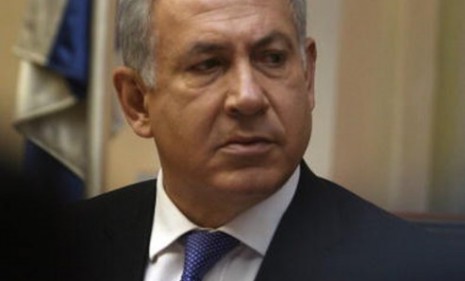Netanyahu's 'invisible' White House visit
No fancy state dinner. No press conference. Not even a photo op. Here, 4 things that didn't happen when the spatting U.S. and Israeli leaders met this week

A free daily email with the biggest news stories of the day – and the best features from TheWeek.com
You are now subscribed
Your newsletter sign-up was successful
In a meeting many hoped would be pivotal to peace talks, Israeli Prime Minister Benjamin Netanyahu visited President Obama at the White House on Tuesday. Despite the meeting's potential to ease tensions over Israel's new housing plans in disputed East Jerusalem, the White House kept the sit-down extremely quiet, treating Netanyahu "as if he were an unsavory Third World dictator," says Jackson Diehl in The Washington Post. Whether the muted visit was a sign of U.S. displeasure at Netanyahu's refusal to budge on the new settlements, retaliation for Israel's perceived snub of Vice President Joe Biden, or hardball negotiating, here are four friendly formalities that were missing:
1. No pomp: A visiting head of state normally gets the red-carpet treatment at the White House, often involving a high-profile social event. Netanyahu got no such niceties during his 89-minute meeting with President Obama, followed by a quick consultation with his staff in the Roosevelt Room, and another 35 minutes with Obama.
2. No photos: Photo ops are standard when leaders meet. But the White House barred media coverage of the Oval Office talks, and refused to allow non-official photographers "to record the scene or even a handshake" between Netanyahu and Obama.
The Week
Escape your echo chamber. Get the facts behind the news, plus analysis from multiple perspectives.

Sign up for The Week's Free Newsletters
From our morning news briefing to a weekly Good News Newsletter, get the best of The Week delivered directly to your inbox.
From our morning news briefing to a weekly Good News Newsletter, get the best of The Week delivered directly to your inbox.
3. No press conference: Typically, the president and visiting leaders issue a joint statement or hold a briefing for the media after they wrap up a meeting. Neither the U.S. nor Israel "released the usual 'readout' of the meetings' content," which is a likely indicator that there's still considerable "distance between the sides" over Israel's illegal settlements, say Laura Rozen and Ben Smith in Politico.
4. No olive branches: A concession from Israel certainly would have shaken things up. But Netanyahu not only expressed defiance on the issue of new settlements, he also lobbied members of Congress for support to "limit Obama’s political ability to demand concessions from Israel in future peace talks," says Jay Bookman in the Atlanta Journal-Constitution.
A free daily email with the biggest news stories of the day – and the best features from TheWeek.com
-
 The environmental cost of GLP-1s
The environmental cost of GLP-1sThe explainer Producing the drugs is a dirty process
-
 Greenland’s capital becomes ground zero for the country’s diplomatic straits
Greenland’s capital becomes ground zero for the country’s diplomatic straitsIN THE SPOTLIGHT A flurry of new consular activity in Nuuk shows how important Greenland has become to Europeans’ anxiety about American imperialism
-
 ‘This is something that happens all too often’
‘This is something that happens all too often’Instant Opinion Opinion, comment and editorials of the day
-
 The billionaires’ wealth tax: a catastrophe for California?
The billionaires’ wealth tax: a catastrophe for California?Talking Point Peter Thiel and Larry Page preparing to change state residency
-
 Bari Weiss’ ‘60 Minutes’ scandal is about more than one report
Bari Weiss’ ‘60 Minutes’ scandal is about more than one reportIN THE SPOTLIGHT By blocking an approved segment on a controversial prison holding US deportees in El Salvador, the editor-in-chief of CBS News has become the main story
-
 Has Zohran Mamdani shown the Democrats how to win again?
Has Zohran Mamdani shown the Democrats how to win again?Today’s Big Question New York City mayoral election touted as victory for left-wing populists but moderate centrist wins elsewhere present more complex path for Democratic Party
-
 Millions turn out for anti-Trump ‘No Kings’ rallies
Millions turn out for anti-Trump ‘No Kings’ ralliesSpeed Read An estimated 7 million people participated, 2 million more than at the first ‘No Kings’ protest in June
-
 Ghislaine Maxwell: angling for a Trump pardon
Ghislaine Maxwell: angling for a Trump pardonTalking Point Convicted sex trafficker's testimony could shed new light on president's links to Jeffrey Epstein
-
 The last words and final moments of 40 presidents
The last words and final moments of 40 presidentsThe Explainer Some are eloquent quotes worthy of the holders of the highest office in the nation, and others... aren't
-
 The JFK files: the truth at last?
The JFK files: the truth at last?In The Spotlight More than 64,000 previously classified documents relating the 1963 assassination of John F. Kennedy have been released by the Trump administration
-
 'Seriously, not literally': how should the world take Donald Trump?
'Seriously, not literally': how should the world take Donald Trump?Today's big question White House rhetoric and reality look likely to become increasingly blurred